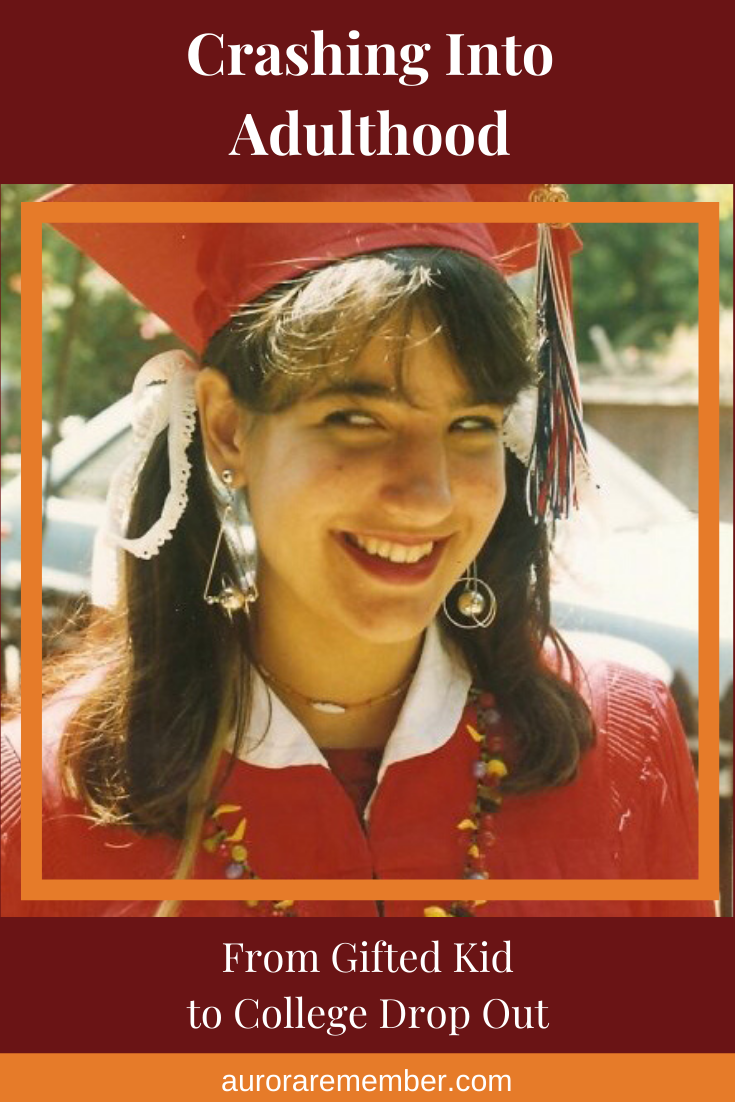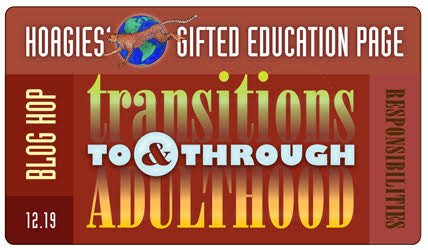I was a late arrival to the gifted program as a kid, but then they sent me to a special program that led to a Middle School placement where there were only 3-4 of us in my grade. By High School I was in a bigger class with all the “high achievers” and was almost kicked out in 10th grade for underachievement.
For the most part though, I squeaked by with Bs and minimal effort. I never learned good study habits and my reading was so slow I had to BS my way through books because I could not keep up with the reading. I picked things up easily enough to get by, and even wrote a fantastic essay that got me into a fancy liberal arts college with the help of my 11th/12th grade English Teacher who was one of the few who really “got” me.

My class was filled with students who had much better grades and scored much higher on the SAT than I did, but somehow there I was!
I’d always been considered a good writer, but suddenly my professors wanted more and when I tried to elaborate I was told I was “rambling.” Turned out because I was a big picture thinker, I didn’t always know what details others found important. And no matter when I started a big assignment, I consistently ended up staying up until 4 AM to finish!
When I was tested for learning disabilities because I couldn’t keep up, I scored so high on most things, with a few average scores, the evaluator said, “why did you even take this test? You got into this school, you must be doing OK.”
Considering I dropped out after sophomore year, I clearly was not doing OK. A bit later, my dad shared a book on ADHD (Driven to Distraction) and it resonated so much I tried to get diagnosed but didn’t follow up on my 2nd appointment and lost all my school paperwork. I recently found the checklist I filled out back then and though I’ve developed more coping skills not much else has changed. After 24 years, I’m finally pursuing the diagnosis when I get decent insurance next year!
The stress and sensory sensitivities I experienced also took a physical toll. I was later diagnosed with Fibromyalgia and Adrenal Fatigue but that spring before I dropped out I crashed so hard I could not get up for morning classes without sleeping in the health center for someone else to wake me up.
Leaving that school was one of my biggest regrets. In fact I tried to get back in but, I had done so poorly the following year in community college due to a low grade depression, they did not let me back in.
Finishing at a state college I was able to resume squeaking by and when I got to grad school, it was in my area of special interest so it was easier to keep up. I also had an accident that made taking notes by hand painful so I started typing all my notes, which turned out to be one of the best things I could have done for my education! Since I’d learned to touch type (one of the more painful and rewarding things I ever had to learn) I could look up and pay more attention while I typed the notes and took WAY more notes than I ever could have taken by hand. It also made it easier for me to connect my notes to the text and go back and add info where needed.
As hard as school was for me, it was also the only system I finally learned to successfully navigate. I became a school psychologist so I could help others navigate school earlier and not feel their issues dismissed like mine were. The realities of the system though can make that a challenge. This is why I work 3 days in schools where I can do what I can, and also outside the system where I have a bit more freedom to support outside the box thinkers in more creative ways.
I feel like it all starts with self-understanding. In grad school, going back to my old college evaluation with fresh eyes, I could see that there was a 50 point gap between my visual and auditory processing. That is statistically significant, but since the lower score was still “within normal limits” it was dismissed as a big issue and I’m not sure anyone had really heard of ADHD until I dropped out. Also, it seems that people tend to use past accomplishments to dismiss current struggles. Just because someone squeaked by when the demands on executive functioning were less, does not mean they can manage the added strain when they hit college.
I was going to share some thoughts on what I’d have liked to know back then, and I decided to put it out to the world of Twitter to see their responses as well. You can find the full thread here for specifics. Some general themes include:
Get a diagnosis/evaluation by someone who understands how to recognize ADHD and/or Learning Disabilities when it may have been masked by giftedness. ADHD wasn’t really a thing people knew about until after I dropped out of my first college, but it was clear that I had a significant weakness in auditory processing that was minimally addressed. It wasn’t until grad school until I really had tools to maximize on my own learning strengths and create systems to support my challenges. Also many of those diagnosed as adults found medication to be a game changer, though I can’t personally speak to that. Accurate diagnosis and self-understanding can also help see your challenges not as a “character flaw” but as a difference in wiring and help to put accommodations in place.
Learn your processing strengths and challenges. Not all evaluations look at processing strengths and weaknesses and there are multiple models for those who do. It’s important that strengths and weaknesses are compared to yourself and not compared to others. An average score can look like a strength when compared to standardized norms, but if other skills are significantly high an average score can be a weakness. I have found this free Cognitive Processing Inventory to be a useful tool in identifying processing strengths and challenges, and I’ve used the professional version to analyze standardized testing results in assessments and consultations.
Practice sticking with something hard. Enough things came easy to me that I never learned the skills to keep going when things got hard. Goal directed persistence is difficult for anyone with executive functioning challenges, but even more so when enough things came easy you never had to learn the skills until you crash. I’ve found a common theme that we tend to hate things we perceive as “work” but love a “challenge,” so sometimes reframing things that way can help but we also need strategies in place to keep going when things go from a fun challenge to hard work.
Set up systems of accountability BEFORE things are due. Those of us with executive functioning challenges often rely on urgency to get things done, which may work up through high school if you can get away with last minute work. This rarely works in college though and you may end up pulling all nighters to get through. Utilize your support network through your school, friends, family or whoever else can help by setting up regular check-ins and have them help you break down longer assignments into manageable chunks and follow up to make sure you followed through.
Don’t be afraid of alternative paths. 4 years in high school, 4 years in undergrad without pause may not be the path for everyone. A gap year, or starting at community college might be something worth considering, or taking minimal credits in the first year. It’s also worth considering alternative types of school or training. Think about the environments where you thrive and don’t be afraid to take a path that works for you.
There are countless strategies that could support students before they crash, and each person is different. You can find more suggestions on this thread, and below I’ll share some suggestions of respected ADHD experts I know:
In this retweet Dani Donovan, who is an amazing and relatable ADHD Comic artist you can find out more about and support her work here, shared additional tips including:
-
Find a quiet space to work that’s not your dorm room (library, computer lab)
-
Block social media with StayFocusd Chrome extension
-
Tell profs about #ADHD
-
Find someone from class to study with
-
Avoid 8:00 AM classes if possible
-
See a counselor *before* things get terrible
-
BEWARE THE LURE OF ONLINE CLASSES
-
Adderall + caffeine = anxiety/no sleep
-
Invest in some noise-cancelling headphones
-
Stop trying to be perfect at everything
-
Get used to saying “no”
-
Re-evaluate your commitments
-
Asking for help when you need it doesn’t make you weak
Thoughts from past Embracing Intensity Podcast Guests include:
Brendan Mahan, of the ADHD Essentials Podcast shares:
-
Time management skills.
-
Being told that college isn’t going to do it for you like high school did.
-
Help finding an effective social group that will both push & support you.
-
Goal-setting skills.
René Brooks, of Black Girl. Lost Keys says, “A diagnosis, some coaching, some skills. Some compassion, some tutoring.”
Emily Kircher-Morris, of the Mind Matters Podcast notes that “the main thing I see my clients needing are self-advocacy skills – asking for accommodations in advance and asking for help when needed.”
Whether you are a parent, a college student or an adult who wished they knew more back then, I’ve been doing educational assessment, consultation and coaching to help both students and adults who are bright and think differently understand their learning strengths and challenges so they can use their strengths and find strategies to support their challenges. The more I work with adults the more I have found that there are so many things we wish we knew, but it’s never too late to understand how we think and learn best!
Although I can’t diagnose ADHD, I did write a post about recognizing signs of ADHD when giftedness is also involved here at “But You’re Too Smart to Have ADHD!”
I’ve started sharing videos related to twice-exceptionality and understanding how we think and learn on my Befriending Your Brain playlist on Youtube.

